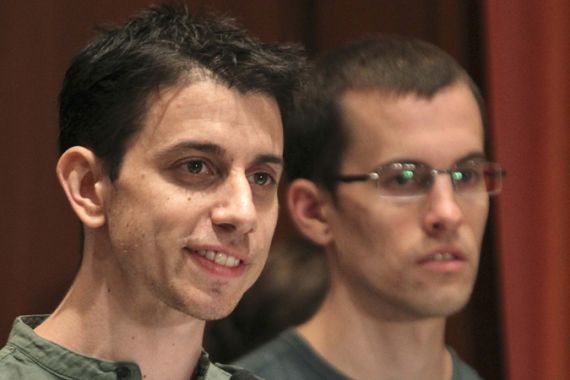‘Hikers’ freed by Iran return to US
Shane Bauer and Josh Fattal return to New York after being held for more than two years and convicted for spying.

| Josh Fattal and Shane Bauer were arrested along with Sarah Shourd near the border with Iraq in July, 2009 [Reuters] |
Two US men freed by Iran after being held for more than two years on accusations of spying have returned to their home country, ending what they called an ordeal that began with a wrong turn into the wrong country.
Shane Bauer and Josh Fattal, both 29, were freed on Wednesday after the Gulf sultanate of Oman paid $1m bail for their release from Tehran’s Evin prison, where they had been held since their arrest on July 31, 2009.
The men have always maintained they innocently strayed into Iran while hiking in northern Iraq’s Kurdistan region, but an Iranian court last month convicted them to eight years in prison for spying.
After meeting their families and Sarah Shourd, who was detained with them near the Iran-Iraq border, in Oman, Bauer and Fattal flew to New York.
In prepared remarks upon their arrival on Sunday, Fattal said that he wanted to make clear that while he and Bauer “applaud Iranian authorities for finally making the right decision”, they “do not deserve undue credit for ending what they had no right and no justification to start in the first place”.
“From the very start, the only reason we have been held hostage is because we are American,” he said, adding that “Iran has always tied our case to its political disputes with the US.”
The irony of it all, Bauer told reporters, “is that Sarah, Josh and I oppose US policies towards Iran which perpetuate this hostility.”
The two also told of difficult prison conditions, where they were held in near isolation.
“Many times, too many times, we heard the screams of other prisoners being beaten and there was nothing we could do to help them,” said Fattal.
“How can we forgive the Iranian government when it continues to imprison so many other innocent people and prisoners of conscience?”
The men read their statements at a news conference on Sunday in New York. They said they would not take questions from reporters.
They said their phone calls with family members amounted to a total of 15 minutes in two years, and they had to go on repeated hunger strikes to receive letters. Eventually, they were told falsely that their families had stopped writing them letters.
“We lived in a world of lies and false hope,” Fattal said.
Fattal called their release a total surprise.
On Wednesday, he said, they had just finished their brief daily open-air exercise and expected, as on other days, to be blindfolded and led back to their 2.4- by 3.9-metre cell.
Instead, prison guards took them downstairs, fingerprinted them and gave them civilian clothes. They were not told where they were going.
The guards led them to another part of the prison, where they met a diplomatic envoy from Oman who escorted them to out of the country.
Shourd was released last year on $500,000 bail, also paid by Oman. Since her release last year, Shourd has lived in Oakland, California.
Chavez role
Mahmoud Ahmadinejad, Iran’s president, agreed to their release last week as the UN General Assembly gathered in New York, saying it was a humanitarian gesture.
Iran’s foreign ministry called their release a gesture of Islamic mercy.
Hugo Chavez, Venezuela’s president, who has maintained a strong relationship with Iran, was reportedly involved in negotiating the hikers’ release.
Temir Porras, Venezuela’s deputy foreign minister, told the Reuters news agency the Venezuelan president took up the case with the government of ally President Ahmadinejad after being alerted to the Americans’ plight by friends in US intellectual circles.
An unnamed source “close to the release process” told Reuters that the US state department had been aware of Chavez’s involvement in the attempts to free the hikers and did not try to block it.
“He talks regularly with President Ahmadinejad. On the occasions he could, he requested it as a humanitarian, brotherly gesture,” Porras said.
“They (Fattal and Bauer) were in an unfortunate situation, wrapped up in geopolitical tensions that went beyond them.”